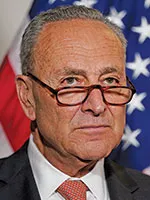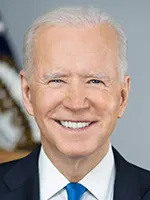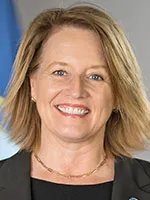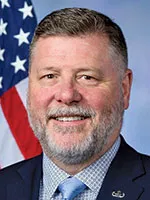Senior Reporter
Biden Enacts Fiscal 2024 DOT Bill

[Stay on top of transportation news: Get TTNews in your inbox.]
President Joe Biden over the weekend signed into law legislation to keep the Department of Transportation and other agencies operating through the current fiscal year. The $460 billion multibill package averted a partial shutdown of programs essential to freight and commuter connectivity.
“Thank you to [Senate] Leaders [Chuck] Schumer and [Mitch] McConnell, Sens. [Patty] Murray and [Susan] Collins, Speaker Mike Johnson, Leader [Hakeem] Jeffries, and Reps. [Kay] Granger and [Rosa] DeLauro, for their leadership,” per a White House statement March 9, noting congressional leadership and the chairpersons and ranking members of the House and Senate funding committees.
The fiscal 2024 law, which expires at the end of September, provides nearly $1 billion for grants and operational services managed by the Federal Motor Carrier Safety Administration. For other agencies, the law provides $62.9 billion for the Federal Highway Administration, $20 billion for the Federal Aviation Administration and $16.6 billion for the Federal Transit Administration.
Tucked in the law are dozens of earmarks for congressional districts. These included $2.5 million for the Port of Warden Truck Access and Bypass Road Project in Washington, $2 million for the US 395 Freight Mobility and Safety Project in California and $850,000 for a zero-mission drayage truck charging program in Washington.

Schumer
“To folks who worry that divided government means nothing ever gets done, this bipartisan package says otherwise: it helps parents and veterans and firefighters and farmers and school cafeterias and more,” Schumer (D-N.Y.) said ahead of the chamber’s consideration of the bill last week.
“The final fiscal year 2024 appropriations bills achieve what we set out to do: strategically increase defense spending and make targeted cuts to wasteful nondefense programs,” Appropriations Committee Chairwoman Granger (R-Texas) said prior to passage in the House.
During his energetic State of the Union address, the president emphasized his administration’s commitment to investing in hundreds of infrastructure projects. A pillar of so-called Bidenomics is 2021’s Infrastructure Investment and Jobs Act, a $1.2 trillion bipartisan law. Investments in supply chain operations, electric vehicle infrastructure and severe weather resilience are among the law’s features.

Biden
“My policies have attracted $650 billion in private-sector investment in clean energy, advanced manufacturing, creating tens of thousands of jobs here in America,” Biden said March 7. “And thanks … to our bipartisan infrastructure law, 46,000 new projects have been announced all across your communities.”
Meanwhile, congressional funding leaders continue to negotiate the terms of funding levels for defense-related agencies. Funding authority for the Pentagon and these other defense-centric agencies expires March 22. Whether Congress returns to so-called regular order for its consideration of annual appropriations bills, citizens and communities would benefit from a return to federal funding certainty. Myriad transportation stakeholders insist short-term federal funding allocations limit long-term infrastructure planning.
The Week Ahead (All times Eastern)
March 12, 10 a.m.: The Senate Environment and Public Works Committee meets for a hearing to consider legislation pertaining to economic development, conservation and emergency management.

Criswell
March 12, 10 a.m.: The House Economic Development, Public Buildings and Emergency Management Subcommittee meets for a hearing titled, “Disaster Readiness: Examining the Propriety of the Expanded Use of FEMA Resources.” Deanne Criswell, Federal Emergency Management Agency administrator, is among the witnesses.
March 12, 10 a.m.: The Senate Finance Committee meets for a hearing titled, “American Made: Growing U.S. Manufacturing Through the Tax Code.”
March 14, 10 a.m.: The Senate Health, Education, Labor and Pensions Committee meets for a hearing titled, “Workers Should Benefit from New Technology and Increased Productivity: The Need for a 32-Hour Work Week with No Loss in Pay.”
Freight Corridor
Again, all infrastructure, as in politics, is local.
Legislative Docket
Approval of a comprehensive water infrastructure bill would improve connectivity at the country’s freight corridors and respond to threats from severe weather events, the leader of the Senate’s surface transportation committee said recently. Environment and Public Works Chairman Tom Carper (D-Del.) renewed calls for colleagues to give bipartisan backing to this year’s Water Resources Development Act.

Carper
The Senate’s WRDA bill is likely to reflect dozens of policy proposals associated with minimizing the effects of extreme weather events as well as responding to climate change. Major storms, devastating floods and intense and frequent droughts have affected many congressional districts. Also, Senate policymakers are likely to pursue flexibility and affordability for projects that operate in partnership with the Army Corps of Engineers.
“To many of us, these are all too familiar topics,” Carper said Feb. 28. “That’s because in the past several reauthorizations, we have made historic changes to [Army Corps of Engineers] policy to address these very issues. We have made cost shares more favorable for underserved and tribal communities. We have given the corps authority to review their contracting procedures.”
 Buzz
Buzz

Crawford
Rep. Rick Crawford (R-Ark.), chairman of the Highways and Transit Subcommittee, announced his candidacy for the chairmanship of the Transportation and Infrastructure Committee. Republicans need to hold the House majority in November to pursue chairmanships in the chamber. The panel is currently led by Chairman Sam Graves (R-Mo.).
“Our transportation and infrastructure system impacts every facet of our economy and daily life, from the food you buy at the grocery store, to the clothes on your back, to the airplane flight to grandma’s house for the holidays, to the safe and reliable energy you use to heat your home, and so much more,” Crawford said March 6. “The work we do on this committee is serious, and it requires a balanced approach from someone willing to work with the other side of the aisle and with hundreds of stakeholder organizations. I plan to lead the committee with strong and effective leadership.”
Favorite Video
Remember, the big investors are watching.
X Marks the Spot
Celebrating herstory this month.
In celebration of #InternationalWomensDay, #ATAWomenInMotion is honored to be collaborating with @the_IRU and @fedex.
We thank the women of transportation across the globe who propel our industry towards success.
WIM Founding Sponsor: @fedex pic.twitter.com/5YeRb0da0G — American Trucking (@TRUCKINGdotORG) March 8, 2024
The Last Word
From Harriet Tubman to Ida B. Wells to Shirley Chisholm, the legacies of these women inspire me to continue fighting for the equality we deserve.
Rep. Sydney Kamlager-Dove (D-Calif.) on March 1
Image
We publish Mondays when Congress is in session. See previous installments of Capitol Agenda here. Email emulero@ttnews.com with tips. Follow us @eugenemulero and @transporttopics.
Want more news? Listen to today's daily briefing below or go here for more info:




